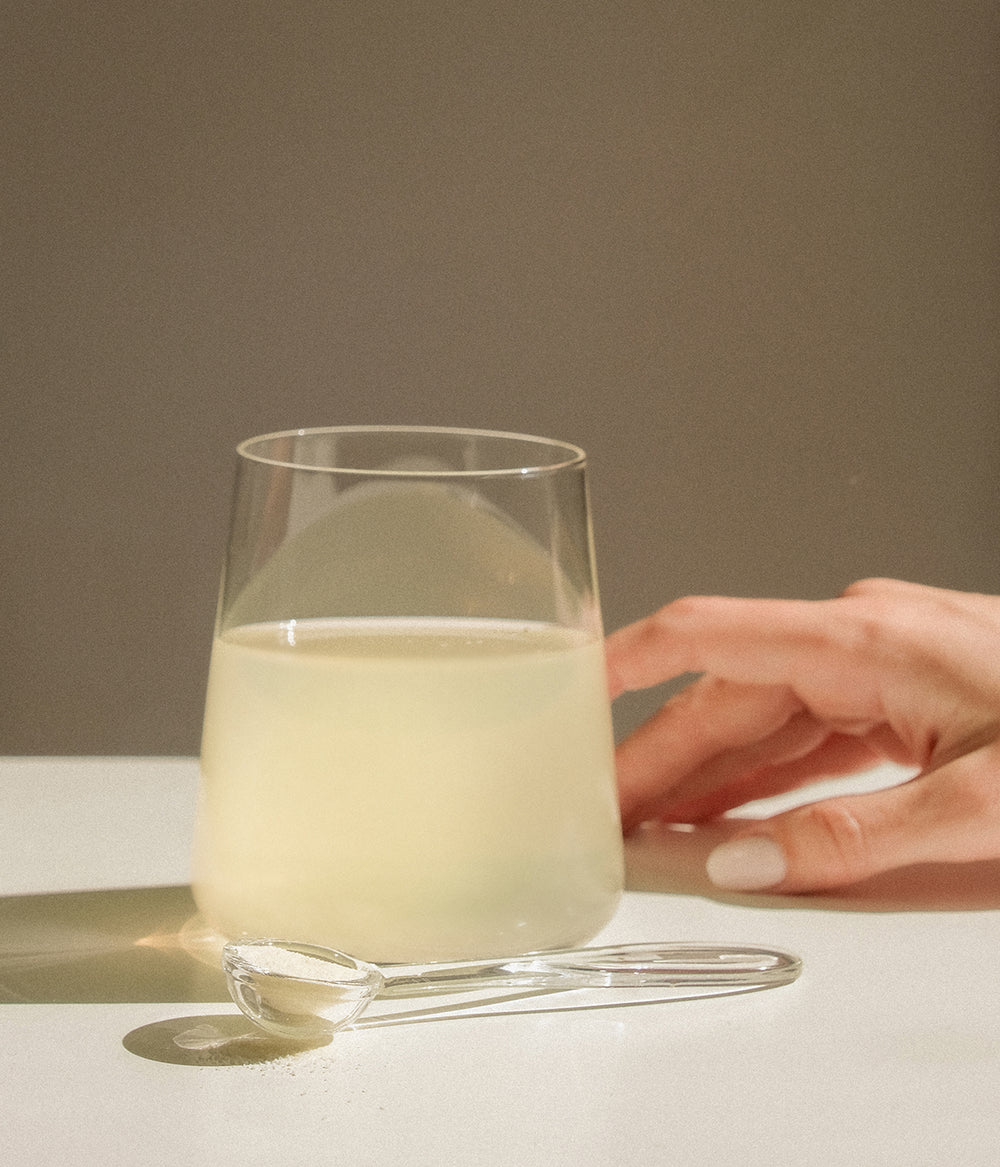You know what they say about beauty—it’s more than skin deep. That's not just a charming aphorism: The health and appearance of our skin, which is our body’s largest organ, is intricately linked to our internal body processes. What (and in what volumes) we eat and drink, and how we live, significantly impact our skin’s appearance and function. The nutrients from our diet are essential for skin cell production, repair, and overall functionality. So, it’s no wonder that ingestible skincare (as an alternative to more traditional topical skincare, i.e. the creams and serums we slather on our dear faces) has been gaining popularity.
“We spend all this money on external skin care, but ultimately what you eat and consume is what makes up the building blocks of skin health,” says Brigit Hadam, Perelel’s Senior Manager of Scientific Affairs (who also happens to be a registered dietitian).
When it comes to the choice between ingestible vs. topical, what is there to know? Collagen and hyaluronic acid (HA) are two buzzy ingredients frequently spotlighted in this conversation. Let’s dig in.
Collagen
Collagen is a major structural protein in our tissues. It's found in skin, hair, nails, tendons, cartilage, and bones. Collagen works with other substances, such as hyaluronic acid and elastin, to maintain skin elasticity, volume, and moisture. It also helps make up proteins such as keratin that form skin, hair, and nails. But aging, sun damage, smoking, and alcohol consumption all decrease collagen production.1
Topical collagen creams and serums face one major challenge in terms of efficacy: molecular size. Collagen molecules are typically too large to penetrate the skin’s outermost layer, which means that while these products may act as excellent moisturizers, locking in moisture and smoothing fine lines temporarily, they really can’t do the work of boosting collagen levels.
Ingestible collagen does not have this same hurdle. When taken as a supplement, collagen peptides are digested and broken down into smaller amino acids, which are then absorbed and utilized by the body to synthesize new collagen. These peptides may stimulate the skin’s fibroblasts, the cells responsible for collagen production.2
One study demonstrated that oral collagen peptide supplementation significantly increased skin hydration and elasticity after eight weeks.3 Another found that participants who took collagen supplements experienced a reduction in eye wrinkle volume and improved skin texture compared to a placebo group.4
Collagen supplements improve the moisture content of the skin, as well as the elasticity of the skin, reducing wrinkling and roughness. Beyond skin care, oral collagen supplements are also beneficial for hair, nails and joint health. They promote healthy digestion, exercise recovery and even more for your body’s overall wellness.5
One thing to keep in mind is that collagen isn’t a complete protein source. “When people say ‘take your protein,’ it should really be a complete source—and then you can have your collagen on top of that. Collagen doesn’t contribute to your daily dose,” says Kayte Angell, Perelel’s Director of Product Development.
Shop the Article:
Hyaluronic Acid
Hyaluronic acid, a naturally occurring polysaccharide found in the skin, connective tissues, and eyes, helps retain water, keeping tissues well-lubricated and moist. Hyaluronic acid binds to and retains water molecules, promoting hydration throughout the body, including the skin. "Hydration is an important aspect of skin health," shares Brigit. "Even if you already drink a good amount of water, more can improve your skin hydration. The amount of hyaluronic acid in the skin is one of the primary measures of skin hydration."
Unlike collagen, topical HA has a much smaller molecular size, allowing it to penetrate the skin’s surface more effectively. It works by attracting moisture from the environment into the skin, providing instant plumping and hydration.
Ingestible HA is often touted for its ability to improve skin hydration from within. One study found that oral HA supplementation significantly increased skin hydration and elasticity in participants after 12 weeks.6 HA supplements may also support joint health and overall tissue hydration, offering broader systemic benefits beyond just skincare.7
Should you try a skincare supplement?
Both topical and ingestible forms of collagen and hyaluronic acid offer distinct benefits, and the choice between them often depends on individual skin concerns and preferences. Ingestible collagen and HA can provide systemic benefits and enhance skin hydration and elasticity from within, while topical applications offer immediate (if fleeting), localized results. A dual action approach might be the most effective—utilizing topical products for immediate hydration and protection, while incorporating ingestible supplements to support long-term skin health and collagen production.
At the end of the day, consistency is paramount because it allows active ingredients to work effectively over time, enabling gradual but sustained improvements in skin health and appearance. Skin cell turnover, the process by which old cells are replaced by new ones, typically takes about 28 days, and longer for mature skin, meaning that consistent application of skincare products is necessary to see visible results.
As is the case with all supplements, ingestible collagen and HA are not FDA-regulated. For this reason, it's important to consult your doctor before making any changes or additions to your regimen—and, of course, to choose your supplier wisely.
References:
- Considering collagen drinks and supplements?
- The effects of collagen peptide supplementation on body composition, collagen synthesis, and recovery from joint injury and exercise: a systematic review
- Oral intake of specific bioactive collagen peptides reduces skin wrinkles and increases dermal matrix synthesis. *
- Daily consumption of the collagen supplement Pure Gold Collagen® reduces visible signs of aging.
- Collagen Supplements for Aging and Wrinkles: A Paradigm Shift in the Fields of Dermatology and Cosmetics
- Oral Hyaluronan Relieves Wrinkles and Improves Dry Skin: A 12-Week Double-Blinded, Placebo-Controlled Study
- Hyaluronic Acid: A Key Ingredient in the Therapy of Inflammation



























